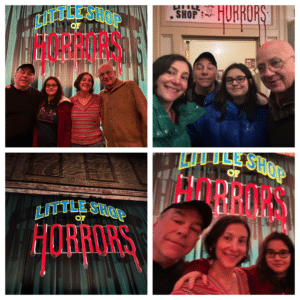Elysha, Clara, Elysha’s father, and I went to Broadway this weekend to see “Little Shop of Horrors.”
Charlie had a play of his own – the last show – and needed to stay behind to operate the spotlight.
One song before the first-act finale, the curtain suddenly dropped, and it was announced that the show was experiencing technical difficulties, so please stand by.
So we waited, assuming that something had gone wrong with Audrey 2, the enormous puppet featured prominently in the show. Though everything had seemed perfectly fine when the curtain dropped, it was hard to understand what else might be wrong.
Ten minutes later, a second announcement was made over the intercom announcing that the show was canceled. Refunds would be made at our point of purchase. Apologies for the inconvenience. Please leave the theater.
The audience was stunned. Everyone remained seated for a moment, absorbing this information, before bursting into applause for all that we had seen and heard before the show was canceled.
It has been a tremendous performance until it wasn’t.
But here was the problem:
The announcement that the show had been canceled came from an intercom system, apparently by an usher or perhaps the theater manager, but it was made hastily, slightly incomprehensibly, and absent any explanation whatsoever.
When audience members did not exit the theater quickly enough, an usher stood at the top of the stairs and shouted that it was time to go. She stressed that it wasn’t an emergency of any kind, but that we needed to leave.
All of this was a mistake.
The audience was seated, staring at a stage, having just spent an hour in the company of great actors. Someone needed to take that stage and make that announcement.
Ideally, a lead member of the cast.
The cast, which amounted to less than ten people, then needed to reappear on the stage and take a bow to an audience that instead applauded an inert curtain.
When things go wrong, and a customer’s expectations are not met, we expect and should demand clear, concise information from the top. In the case of a Broadway theater, the “top” would at least amount to the theater’s manager, but ideally, from a member or members of the cast, and ideally from the stage rather than some unidentified, disembodied voice.
Some audience members cried at the news of the cancelation, and understandably so. My family attends half a dozen or more Broadway shows every year. We live two hours from New York, so attending a show like this isn’t hard. I had already purchased tickets to the same show, in the same seats in May, while driving over to the restaurant for dinner.
Charlie will get to join us this time, so it actually worked out well for him.
For us, this was an inconvenience. Not a lost opportunity.
However, the large school group sitting in the back, waiting for their bus to return and pick them up, may never have a chance to return. Tourists and visitors to the city from far away might never be able to return to this show.
For some, this may have been their first Broadway show. They may have saved for weeks, months, or more to afford the tickets. Even with a refund, some might find returning to the city impossible.
For many, the cancellation of this show halfway through was a big deal. They deserved more than a disembodied intercom announcement absent any explanation or a genuine apology. Had a cast member or members taken the stage and expressed their sincere regret for circumstances beyond their control, the audience would’ve reacted far better. We would’ve felt cared for and appreciated.
If you lack any information, rumors quickly spread. It was pouring rain that day, so many speculated that rain had leaked into the theater and caused a problem with the machinery that operated the puppet. Others posited that the lead actress had suddenly become ill. Others wondered if something had gone wrong on the roof.
I don’t know if any of these rumors were true, but in the absence of information, misinformation is allowed to fester.
It would’ve been quite easy to offer the audience information on the cancelation.
Take care of your customers at all times, but especially when something has gone terribly wrong. When you know that at least some of your customers have gone above and beyond to purchase your product, as is often the case for a Broadway show, take extra special care of your customers.
Treat them like gold.
A small amount of effort could have gone an exceptionally long way on Saturday. Unfortunately, the audience left the theater confused, disappointed, saddened, and angry.
We deserved better.









